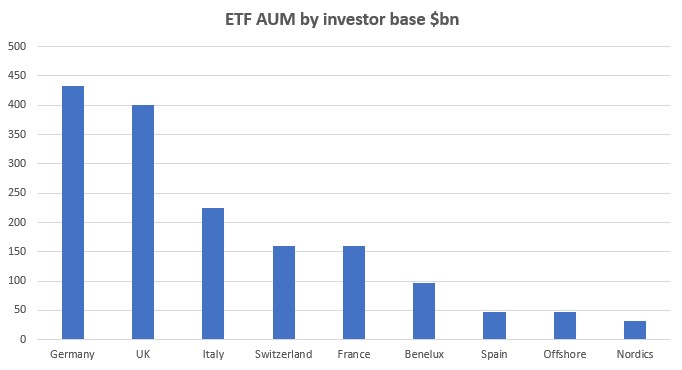While it was another stellar year for the growth of ETF assets across Europe in 2021, in among the recorded-breaking flows, one market is asserting itself as the next big ETF powerhouse.
Flows into ETFs were strong across the continent – net inflows hit $195.3bn while assets under management (AUM) topped $1.6trn – it has been no secret Germany has been making strides in the ETF space.
According to research by Blackwater Search and Advisory, German investors have the most amount of assets invested in ETFs, with a market share of 27% ($432bn), ahead of the UK’s 25% ($400bn) and almost double its next biggest rival Italy, which has a market share of 14% ($224bn).

Source: Blackwater Search and Advisory
Germany is also the third largest market in terms of domiciled ETF AUM – behind the tax havens of Ireland and Luxembourg – with €76bn in assets at the end of October 2021, almost double France (€41.7bn) and Switzerland (€37.6bn).
Michael O’Riordan, founding partner at Blackwater Search and Advisory, said: “All of the ETF issuers are getting excited about Germany. They see it as the next frontier of growth as retail investors get stuck into ETFs.
“You could look at what's happened in the US and see it formulate in Germany to a certain extent.”
Not traditionally a nation of stock market investors, the growth of the German retail market has been well documented, driven by coronavirus fuelled do-it-yourself (DIY) investors, piqued interest in ESG investing and, most importantly, a surge in self-directed clients – those investing in a specialised ETF savings plan.
Self-directed client boom
The ETF saving plans allow individual investors to establish a flexible and customisable investment strategy, often from as little as €50 a month. They have been hailed by the industry as easy for DIY investors to understand, low cost and transparent and have been hugely popular with investors.
The number of people investing in an ETF savings plan has more than doubled from 1.3 million at the end of 2019 to more than three million at the end of 2021, according to industry estimates quoted by Deutsche Boerse. Furthermore, the amount being invested has also rocketed up a staggering 254%, up from €166m a month in 2019 to €589m a month in 2021.
As Sidi Kleefeld, head of ETF sales advisory and strategy at DWS, said. “COVID-19 had been a special growth accelerator for the digital banks' segment, as the time in lockdown has given many retail investors time to rethink their savings.
“The V-shaped recovery of markets since the COVID-19 crash and the new all-time highs almost all markets have reached have helped to drive investments into the market and therefore into ETFs.”
Kleefeld added the quota of equity investments is still low in Germany, with plenty of room to grow.
On its current trajectory, it is clear the German ETF market still has a huge amount to grow. Research by BlackRock and extraETF published in 2021 estimated it could rise to nine million by 2025, revising up their earlier growth projection of seven million.
“All the ETF issuer guns are trained on Germany in terms of their distribution strategies at the moment,” O’Riordan added. “It is the market they see the most growth coming and that is because of retail. This growth of the retail in other countries across Europe is still very underdeveloped.”
Caroline Baron, head of ETF distribution for EMEA at Franklin Templeton, said it is an area of the market that has grown in importance for its ETF business.
“The retail adoption in Germany is a big change versus a few years ago and the strategy has been to focus on this part of the market. Savings plans have been something we have focused on quite a lot, we think it will only increase,” she said.
Christopher Mellor, head of EMEA ETF equity and commodity product management at Invesco, added Germany has been a strong growth area for the firm, an important factor in the group achieving €8.5bn inflows last year.
Growth in platforms
One major driver has been the growth in trading platforms and neo banks such as Scalable Capital that have worked closely with ETF issuers for investors to construct their portfolio.
Both Invesco and Franklin Templeton said they have worked closely with the platforms to market their ETFs to the burgeoning investor base.
“We work very closely with some of these platform partners and they have done a very good job of offering that service and opportunity to investors. We are happy to work with them to help investors get exposure to all the different options,” Mellor said.
Nevertheless, the speed of the growth has been impressive. According to DWS, the ETF AUM of the German digital banks grew from €34bn at the end of 2019 to €71bn at the end of September 2021, with much of the demand being driven by younger investors.
Jacob Hetzel, head of distribution at Scalable Capital, said: “Recently there has been a huge boom and demand from German retail investors. We see a great interest especially among younger investors especially who can use neo-brokers like Scalable Capital.”
The number of new investment accounts being opened is at its highest point in the last 20 years, while 77% of the new accounts opened with digital banks, according to Barkow Consulting and digital asset manager Whitebox.
“We are confident that the demand for ETFs will remain high and is continuing to rise,” Hetzel added. “Since ETFs are an efficient way of investing money, the current trend represents a logical evolution of financial investments into a simpler and more transparent structure. ETF savings plans make it easy to invest regularly.”
An institutional tailwind
With the retail investment boom already underway, retail still only accounts for roughly 10% of the market across Europe and it is important to note a part of the German ETF growth story’s roots lay in the institutional market.
Kleefeld said: “Institutional investors have also increased their ETF holdings. Insurance, corporates, pensions, and family offices among others are all active users of ETFs. This is driven by negative real yields, where low-cost ETFs offer a very compelling offering on the fixed income side.”
She added “huge demand” for ESG ETFs has been boosted by institutional clients either launching new ESG portfolios or converting existing portfolios into ESG.
“Many investors have seen the benefit of ESG ETFs, as they offer a clear-cut set of rules on what the ESG index offers,” Kleefeld said.
While the comparison to the US retail investment market still feels a long way, it is the first time a European market has genuinely shown signs it could be fully opened up to retail investors.
Baron said: “It has taken some time, post-Retail Distribution Review (RDR) in the UK, which is not yesterday by the way, people thought retail adoption is going to be here. We have progressed a bit, but not massively. What we are observing today in Germany is a big change.”
Related articles









